Soundproofer Chiswick Greater London (W4): If your property in Chiswick is being affected by noise, maybe you should consider installing some soundproofing to bring a new sense of tranquility to your lounge, bedroom, home office or studio. Alternatively you may wish to soundproof a particular room to keep noise in, for example in a home cinema or family room, to avoid disturbing others. Whichever soundproofing needs are required, it will be essential for you and your neighbour's peace of mind and sanity.
First of all it might help if we understand exactly how sound travels and is transmitted before we are able to find ways to combat any excessive noise escaping from or intruding into your property.
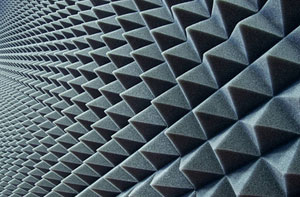
Sound can travel in only two ways:
1. Around and within a solid object by reflection and vibration.
2. By the vibration of air molecules.
Despite the fact that sound also travels through water, unless you're wanting to isolate noises from a swimming pool or aquarium, we will just be concerned with how to reduce sound transmission in the rooms of a property.
SOUND TRAVEL THROUGH THE AIR
Substantial amounts of sound can be transferred into and out of a room through open air-ducting, ill fitted windows, gaps around doors and even electrical switches and sockets. All noise and sound will initiate movement and vibration of the air molecules, and it is this that we pick up and hear. It does not matter if it's machinery, children playing, passing aircraft, music playing or road traffic, they all produce and transfer sound in the same manner.
Any gaps in a room can be looked at as leaks and will have to be closed off.
SOUND TRAVEL THROUGH OBJECTS AND STRUCTURES
Sound waves can also be transferred to, absorbed by or reflected by solid objects and structures. The ceilings, floors and walls will all have an impact on how sound moves around an area, and can even transport those vibrations to other rooms in a property. Care should be taken with brick or solid concrete walls, such as in cellars or basements, because sound can be reflected and sometimes even amplified to other areas of your house.
How can we stop these sounds and vibrations affecting other folks? Soundproofing is the answer.
BASIC STEPS IN SOUNDPROOFING
Give some thought to covering a bare floor, which resonates and reflects sound, with a carpet or rug. Such a simple solution can spruce up a room and help dampen down any noises to boot. Wall coverings or window drapes can also be employed to enhance soundproofing and are easy to install.
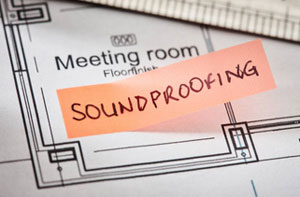
Locating and plugging any gaps in your room, think windows, light fittings, sockets and door frames, is also a straightforward job for a capable DIY'er. It is possible to purchase specialist acoustic sealants in many DIY stores that repress the transfer of sound by suppressing it. There could be a little difference in price in comparison with a regular sealant, but the soundproofing capabilities are far better and can make an enormous difference to a room's soundproofing.
If you are going to be redecorating or renovating while considering your soundproofing requirements, then think about putting up an additional skin of plasterboard (also known as gypsum board, sheet rock or drywall). Plasterboard is a very dense material that's both economical and efficient for soundproofing purposes. It is ideal for spaces like home offices, music studios or home cinemas that are being built within the home. If you're not proficient in fitting studding and plasterboard, it's advisable to use a specialist team to guarantee the optimum soundproofing improvements from its installation.
One final easy soundproofing option is to examine the materials from which your doors are made. Hollow doors are a fairly cheap option although their soundproofing qualities are far from the best. Solid wood doors, while a little bit more pricey, can do wonders for soundproofing a room.
PROFESSIONAL SOUNDPROOFING CHISWICK
Some properties, for example those on aircraft flight-paths or next to busy roads, naturally have more sound issues and will require other ways to address the dilemma. You'll obtain the best possible soundproofing outcome by hiring the services of an experienced soundproofing company.
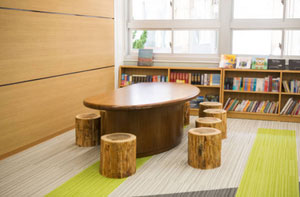
They will ask the four following questions during the initial analysis of your needs:
- What kind of area or room do you wish to soundproof? Does it have a brick wall, a stud partition wall or a lined concrete wall etc.
- How large is the space that needs soundproofing?
- What noise or sounds are you trying to suppress? i.e. External factors such as neighbours, aircraft, road noise etc, or internal sounds from a home cinema or music studio.
- What is the main point where the noise creates the most issues? i.e. Is it coming from the walls, through doors, down from above or up through the flooring, or is it a mixture of all these factors.
An experienced soundproofing installation company in Chiswick will consider all these factors to provide remedies for your noise problems for various budgets. Solutions will vary according to the different materials required for each of the problem areas in your environment.
PROFESSIONAL SOUNDPROOFING OF CEILINGS, FLOORS and WALLS
To soundproof any sort of room requires 2 key approaches:
- The absorption of sound will need to be increased.
- Reduce the effect of sound reflection, amplification and vibration by hard surfaces.
An on-site survey is going to be needed to look at the areas that need to be improved.
A professional will look at the different ways to add mass and density to the main trouble spots. The addition of acoustic foams and rubbers of different mass and density will help in absorbing noises and reduce reflections and transmission sources.
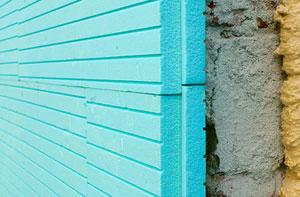
Insulation between any existing voids will be upgraded to lower the noise resonation and amplification of these sound boxes. Floor and ceiling voids and wall cavities can all be assimilated with a drum, where the space acts like an amplification source for any undesirable sounds.
It is far better to use mixed layers of different densities to soak up unwanted noises than a single layer fabricated from one material. This is due to the fact that the various different materials react in different ways with varying frequencies and will deliver a much better acoustic resolution to your soundproofing project.
The Building Regulations (Part E) cover the soundproofing of residential properties, and must be observed by any installation company in Chiswick. This set of regulations is a requirement in law to protect yourself and neighbours from the negative effects of sound pollution in an environment where folks live and work.
Trade bodies in the soundproofing industry that offer training, advice and qualifications are the Institute of Acoustics (IOA) and the Association of Noise Consultants (ANC). A trustworthy soundproofing firm in Chiswick will have been checked for the professionalism and quality of their workmanship to have been accepted as a member of these trade organisations.
Where is it Available?
Soundproofing services are available in Chiswick and also in nearby places like: Hammersmith, Acton, Greenford, Alperton, Brentford, Kensington, Gunnersbury, Kensngton, Emlyn Gardens, Mortlake, Chelsea, Shepherds Bush, Grove Park, White City, Ealing, Brackenbury Village, Kew, Bedford Park, and in these postcodes W4 3SN, W4 3NP, W4 3NU, W4 3QJ, W4 3HT, W4 3AG, W4 3DU, W4 3PA, W4 3PU, and W4 3EW. Locally based Chiswick soundproofing specialists will probably have the postcode W4 and the phone code 020. Checking this should confirm that you access local providers of soundproofing. Chiswick homeowners can utilise these and countless other similar services. Home and property owners who are in need of soundproofing quotations can just click on the "Quote" banner provided.
Soundproofing or Acoustic Underlay Chiswick
One of the many ways of adding some soundproofing to your Chiswick property, without any significant disruption, is to install soundproofing or acoustic underlay. These soundproofing underlays can be successfully used on both concrete and timber floors, and beneath laminate, carpet, engineered wood and vinyl planks floor coverings.
Basically, soundproofing underlay can be an especially beneficial solution when your problem is not so much airborne noise but mainly an impact noise issue. A lot of households in Chiswick tend to have a significant problem with impact noise, and this is mainly down to the popularity of "hard" floor finishes, which are more widespread right now. Rooms upstairs are the main origin of such issues, with moving furniture, kids stomping around and general footfall being typical concerns.
Although some carpet companies might attempt to sell you normal carpet underlay with claims that it has soundproofing attributes, this should not be confused with genuine acoustic or soundproofing underlay. Make sure you purchase a decent acoustic underlay, if you have significant issues with noise.
Although impact noise can be substantially lowered through the use of acoustic underlays, they have varying degrees of success with regards to blaring TV's, loud music and incessant talking, and other airborne noise pollution. Hence, when selecting an underlay product it's vital to understand the exact types of noise you're looking to minimise, and discuss this with your soundproofing specialist or supplier in advance.
Acoustic Mineral Wool
Acoustic mineral wool is a highly effective material for improving sound insulation in buildings, making it a popular choice for both residential and commercial projects. Known for its excellent noise-absorbing properties, it helps to reduce sound transmission between walls, floors, and ceilings. Whether you're trying to create a quieter home environment or enhance privacy in office spaces, acoustic mineral wool is a reliable and versatile solution. It works particularly well in areas where noise levels are high, such as recording studios or home theatres in Chiswick.

Acoustic mineral wool stands out for its unique ability to block sound, thanks to its dense fibre composition. These fibres absorb and trap sound waves, effectively reducing both airborne noises, like speech and music, and impact sounds, such as footsteps on hard surfaces. It also comes with the added bonus of being fire-resistant, enhancing safety. Available in a variety of thicknesses, it's versatile enough to fit into stud walls, between joists, or behind suspended ceilings.
If you want to enhance soundproofing with minimal structural modifications, consider using acoustic mineral wool. This straightforward option is perfect whether you're renovating a property or embarking on a new build. By incorporating this material, you can truly transform the comfort level of your space. It's an investment that pays off in terms of peace and quiet, allowing you to enjoy a more private setting for work, relaxation, or leisure activities. (Tags: Acoustic Mineral Wool).
Noisy Neighbour Soundproofing
 The presence of a noisy neighbour next door can be an absolute nightmare to live with. Your peace and quality of life can be quickly disrupted by constant noise such as loud music, barking dogs or endless parties. One solution to this issue is soundproofing. Soundproofing involves adding materials to floors, walls and ceilings to block or absorb sound. The commonly used materials for soundproofing are mass-loaded vinyl, acoustic foam and soundproof curtains. Your walls can be fitted with sound insulation, or you can opt for double-glazed windows to reduce external noise. However, soundproofing can be a costly and time-consuming process, and it might not always be feasible for renters. Therefore, it's vital to communicate with your neighbour and reach a resolution that benefits both parties. If you're unable to reach a resolution with your neighbour, you can contact your local council or seek legal advice to address the noise issue. If the noise is causing significant distress or disturbance, it's crucial to seek help from mental health professionals and prioritize your well-being.
The presence of a noisy neighbour next door can be an absolute nightmare to live with. Your peace and quality of life can be quickly disrupted by constant noise such as loud music, barking dogs or endless parties. One solution to this issue is soundproofing. Soundproofing involves adding materials to floors, walls and ceilings to block or absorb sound. The commonly used materials for soundproofing are mass-loaded vinyl, acoustic foam and soundproof curtains. Your walls can be fitted with sound insulation, or you can opt for double-glazed windows to reduce external noise. However, soundproofing can be a costly and time-consuming process, and it might not always be feasible for renters. Therefore, it's vital to communicate with your neighbour and reach a resolution that benefits both parties. If you're unable to reach a resolution with your neighbour, you can contact your local council or seek legal advice to address the noise issue. If the noise is causing significant distress or disturbance, it's crucial to seek help from mental health professionals and prioritize your well-being.
Acoustic Door Seals
To achieve optimal sound insulation in buildings and structures, the use of acoustic door seals is crucial. These seals work by restricting the flow of noise through doorways, resulting in improved overall sound insulation.
Acoustic door seals are made up of a mixture of materials, such as rubber, foam and weatherstrip, that are chosen for their sound-absorbing and blocking properties. These seals are used to prevent sound waves from passing through cracks and gaps in door frames, ensuring that sound remains contained within an area. To improve their soundproofing properties, certain acoustic door seals sometimes also include sound-deadening materials such as mass loaded vinyl.
The ability of an acoustic door seal to effectively reduce noise is influenced by various factors such as its shape, installation location and size. To achieve the best possible sound insulation, it's vital to use door seals that are especially designed for the purpose of the room and the type of door. For instance, doors leading to lecture halls or recording studios require more elaborate soundproofing solutions compared to those leading to private offices.
For optimal functionality of an acoustic door seal, proper installation is crucial. The door seal should be installed without any gaps between it and the door frame, and periodic replacement is essential to retain its sound-blocking properties.
To sum things up, acoustic door seals are a powerful means of improving the sound insulation of an area. Whether it's for a private office, a lecture hall or a music room, the right door seals can have a substantial impact on your soundproofing efforts.
Mass Loaded Vinyl
Mass loaded vinyl (MLV) functions as a noise-blocking soundproofing material. Composed of a blend of vinyl and heavy materials such as barium sulphate and calcium carbonate, it achieves a high density. Due to its density, MLV is able to block sound waves from passing through walls, ceilings, or floors.
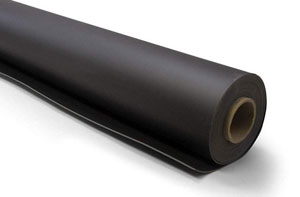
A major benefit of this material is that it has considerable flexibility. Mass loaded vinyl is ideal for use in tight or awkward spaces, as it can be bent and shaped around various surfaces, unlike rigid soundproofing materials. It is regularly installed in offices, homes, and vehicles to reduce unwanted noise.
By adding mass to a surface, mass loaded vinyl helps reduce the amount of sound that can travel through. The larger the mass, the tougher it is for sound to get through. Adding mass loaded vinyl to floors or walls allows for a considerable decrease in noise coming from other rooms or outside.
MLV is a versatile and effective choice for soundproofing overall. This product is available in rolls and can be cut to size, ensuring easy installation for both professionals and DIY enthusiasts. While it might cost more than alternative materials, its effectiveness makes it worth the investment, especially in areas with high noise levels.....READ MORE (Mass Loaded Vinyl Chiswick)
Acoustic Glazing Chiswick
Looking to muffle noise from outside? Acoustic glazing, or soundproof glazing, is a window solution designed for that very purpose. In busy urban settings and near noisy locations like railway stations or airports, this type of glazing is especially useful. Limiting the amount of outside noise entering a home or building in Chiswick is the primary aim, aiming to create a more comfortable and quieter inside space.
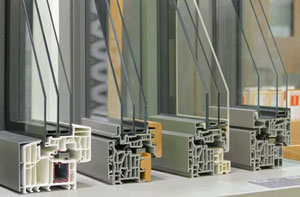
Acoustic glazing achieves its noise-dampening effect by using several glass panes separated by a specialised acoustic interlayer. The interlayer is normally made of a plastic material that efficiently absorbs sound waves. These layers enable the window to substantially diminish sound transmission, unlike standard double or single glazed windows. To enhance the soundproofing effect, the distance between the glass panes and the thickness of the glass can also be adjusted.
While noise reduction is its main objective, acoustic glazing offers an impressive range of other perks. By improving thermal insulation, it helps Chiswick homes and businesses maintain a comfortable temperature year-round, reducing cooling and heating needs. With its multi-layered construction making it more difficult to break, it also provides a better level of security. All in all, to improve living or working environments in Chiswick, acoustic glazing provides a viable option by fostering a calmer and quieter atmosphere. (Acoustic Glazing Chiswick)
Sound Absorption Solutions Chiswick
Sound absorption solutions are essential for creating more comfortable and quieter spaces in Chiswick. Helping to muffle unwanted noise, these solutions absorb sound waves and stop them from bouncing around a room. Commonplace materials for sound absorption include carpets, acoustic panels and foam. To improve sound quality and reduce echoes, such materials are frequently used in homes, studios and offices in Chiswick.
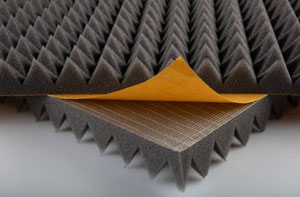
Installing sound absorption solutions is straightforward. Rugs and carpets can be places on floors to muffle noise, and sound dampening acoustic panels can be mounted on ceilings and walls. In home theatres and recording studios in Chiswick, foam panels are a particularly popular option for lining walls. These noise reduction solutions have the added advantage of improving a space's acoustics, leading to a more comfortable experience.
Both your comfort and health can be improved by investing in sound absorption solutions. Distraction and stress caused by excessive noise can have an impact on productivity and well-being. By implementing such solutions, you create an environment that is more peaceful, perfect for relaxing, working, or enjoying entertainment. Sound absorption solutions provide a practical and effective choice, whether you need to improve your home audio setup or quieten a noisy office. (Sound Absorption Solutions Chiswick)
Soundproof Curtains
Acoustic curtains, noise-reducing curtains, and soundproofing curtains are all effective solutions for reducing unwanted external noise and creating a quieter and more peaceful environment indoors. These specialised curtains are designed to absorb, block and dampen sound waves, making them an appealing option for individuals looking to improve their working or living spaces in Chiswick.
A combination of dense materials that are capable of reflecting and absorbing sound waves is used to produce soundproofing curtains. The typical layers of soundproof curtains are heavy fabrics, such as velvet, suede, or multiple layers of woven fabric, along with an inner core made from foam or mass-loaded vinyl. Mitigating the transmission of noise from outside sources, these materials work together to effectively reduce the sound levels that enter a room.

Soundproof curtains are a great option for those who want noise reduction without the hassle of difficult installation. While traditional soundproofing methods involve complex construction or modification of ceilings, floors and walls, these curtains can be simply hung on existing curtain rods or tracks, making them a much easier and more convenient option. This makes them a convenient and cost-effective option for both householders and tenants in Chiswick who want to reduce noise without making irreversible changes to their living areas.
Soundproof curtains are not only functional, they can also be used to create a variety of visual effects. They are available in various patterns, colours and designs, allowing homeowners to choose options that match the interior decoration of their home. These curtains are both aesthetically appealing and effective at soundproofing the room.
When selecting soundproof curtains, it's essential to consider the particular noise problems you're experiencing. Different curtains offer varying levels of noise reduction, generally measured in decibels (dB). Some soundproofing curtains may insulate against external noise better than others, while some may focus on absorbing echo and reverberation within a room, making them ideal for recording studios, home theatres or office spaces.
Even though soundproof curtains are capable of substantially lowering noise levels, it's important to remember they may not fully eliminate every sound. The material from which the curtains are made, their thickness and the frequency of the noise are all elements that can have an impact on their performance. Additional soundproofing techniques, such as sealing gaps around doors and windows, installing acoustic panels or using weatherstripping, can complement soundproof curtains to enhance noise reduction.
In a nutshell, peace and serenity doesn't need to be an extravagance. Soundproof curtains offer an accessible and functional solution to create a more restful indoor environment. Soundproof curtains are a priceless addition. Aesthetically pleasing, easy to install, and highly effective at minimising external noise, they're ideal for workplaces, homes, and any space that needs a touch of tranquillity. By understanding their many features and choosing the most appropriate curtain based on specific needs, individuals can reap the benefits of enhanced comfort and tranquility within their working or living spaces. (78767 - Soundproof Curtains Chiswick)
Local Soundproofing Enquiries

Current soundproofing projects: Taylor Woods in Acton was searching for somebody who could soundproof a property, Erin Stevens was trying to find soundproofing installers near Emlyn Gardens, Stephanie Harvey from Shepherds Bush asked the question "is there somebody who does soundproofing near me?", Nicole Booth from Brentford was trying to find a soundproofing company in the Brentford area, Alexis Dixon recently requested a quote for soundproofing a library room in Kew, Robert Green recently asked for a quote for reducing the levels of sound transmission in a cottage in Bedford Park, Hannah Watson from Bedford Park were looking for someone who could soundproof a basement, Kyle Bell recently enquired about the possibility of soundproofing a converted loft space in a cottage in Kensngton, Victoria Jenkins recently requested a price quote for installing secondary acoustic glazing in a property in Brentford, Brian Harvey recently enquired about getting a price for soundproofing the internal walls of a flat in Shepherds Bush, Kayla Martin recently requested a quotation for soundproofing the ceilings of a house in Grove Park, Tyler Rogers recently enquired about the possibility of reducing the level of footstep noise in a house in White City, Megan Wright recently asked for a quotation for soundproofing an apartment in Acton, Jose Atkinson recently requested a price quote for soundproofing a party wall in Greenford.
Soundproofing Near Chiswick
Also find: Brackenbury Village soundproofing, Hammersmith soundproofing, Kew soundproofing, Brentford soundproofing, Mortlake soundproofing, Alperton soundproofing, Kensington soundproofing, Greenford soundproofing, Emlyn Gardens soundproofing, Shepherds Bush soundproofing, Chelsea soundproofing, White City soundproofing, Ealing soundproofing, Kensngton soundproofing, Grove Park soundproofing, Bedford Park soundproofing, Acton soundproofing, Gunnersbury soundproofing and more. There are firms who do soundproofing in all these areas. Their extensive knowledge and expertise empower these experienced specialists to execute high-quality soundproofing on your home. These companies’ principal objective is to provide bespoke solutions that effectively mitigate noise pollution, creating a more peaceful and quieter living environment for occupants. Local home and property owners can get soundproofing estimates by simply clicking here. Does your home have rooms that need soundproofing? Get a quote today!

Other Tradespeople in Chiswick: Home improvements in Chiswick often require the skills of various different tradesmen, and a flooring installer in Chiswick, waste & rubbish removal in Chiswick, a heating engineer in Chiswick, an electrician in Chiswick, a bricklayer in Chiswick, dry lining in Chiswick, a tiling specialist in Chiswick, a cleaner in Chiswick, loft conversion in Chiswick, a locksmith in Chiswick, a double glazing specialist in Chiswick, SKIP HIRE in Chiswick, a roofing contractor in Chiswick might be necessary even though you're currently searching for soundproofing in Chiswick. Follow the links to get free quotes for all types of home improvement work.
Chiswick Soundproofing Tasks

There is a range of work that can be conducted by your local Chiswick soundproofing expert including soundproofing solutions, door soundproofing, soundproof noise from downstairs, soundproofing plasterboard in Chiswick, noise measurement services, floor soundproofing, soundproofing home movie rooms, acoustic panels, sound insulation testing, soundproofing surveys, underfloor soundplank installations, acoustic flooring, party wall soundproofing, acoustic fencing, sash window soundproofing, acoustic mineral wool installation in Chiswick, soundproofing gyms in Chiswick, machinery & plant noise testing in Chiswick, echo reduction, commercial soundproofing, soundproofing underlay, cellar soundproofing, acoustic noise cancelling services, wall soundproofing services, soundproofing for ceilings, noisy neighbour soundproofing, acoustic solutions in Chiswick, noise control, acoustic glass, sound management services, and more. Listed are just a selection of the duties that are handled by tradesmen fitting soundproofing. Chiswick providers will let you know their entire range of soundproofing services.
More: Noise Muffling, Noise Reduction Services, Noise Reduction Services, Soundproofing Specialists, Acoustic Solutions, Soundproofing Specialists, Sound Reduction, Noise Control, Cheap Soundproofing, Soundproofing Companies, Cheap Soundproofing, Noise Reduction, Noise Elimination, Sound Reduction, Noise Muffling, Soundproofing Solutions, Soundproofing Solutions, Soundproofing Specialists, Cheap Soundproofing, Noise Control Services, Soundproofing Companies, Soundproofing Services, Noise Elimination, Sound Muffling, Sound Muffling, Noise Reduction Services, Soundproofing Experts, Noise Prevention, Soundproofing Companies, Soundproofing Experts.
Domestic Soundproofing Chiswick - Wall Soundproofing Chiswick - Soundproofing Companies Chiswick - Ceiling Soundproofing Services Chiswick - Noise Reduction Services Chiswick - Floor Soundproofing Chiswick - Soundproofing Near Me - Soundproofing Estimates Chiswick - Soundproofing Services Chiswick



